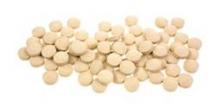Selenium supplementation provided no benefit over placebo for the prevention of second primary tumors in patients with completely resected stage 1 non–small cell lung cancer in a randomized phase III trial.
In 1,040 patients who were randomized to receive selenium and 521 patients randomized to receive placebo, the incidence rates of lung and overall second primary tumors (SPTs) were similar (1.62 and 3.54 per 100 person-years vs. 1.30 and 3.39 per 100 person-years, respectively). Five-year disease-free survival (DFS) rates were 74.4% and 79.6% for the selenium and placebo groups, respectively, Dr. Daniel D. Karp of the University of Texas M.D. Anderson Cancer Center, Houston, and his colleagues reported.
The findings were published online Sept. 3 ahead of print in the Journal of Clinical Oncology.
Patients included in the double-blind study were adults aged 18 years or older who were 6-36 months out from complete resection of histologically proven stage 1A or 1B non–small cell lung cancer (NSCLC). Selenium was given at a dose of 200 mcg daily for up to 48 months (J. Clin. Oncol. 2013 Sept. 3 [doi: 10.1200/JCO.2013.49.2173]).
At a planned interim analysis in October 2009, a data monitoring committee determined that "it was highly unlikely that this study could eventually show significant evidence of benefit from selenium," and the following month accrual was discontinued and participating patients discontinued treatment and entered the follow-up phase.
At the interim analysis, there were 83 cases of lung SPT, corresponding to 46% of the originally planned end points. The incidence rates of lung SPT were 1.91 and 1.36 per 100 person-years in the selenium and placebo groups, respectively.
"Overall, the SPT incidence rate was higher in the selenium arm but not significantly. Five-year DFS was 72% for selenium and 78% for placebo," the authors noted.
At the more recent analysis in June, 2011, there were 252 reported SPTs in 224 patients. Of these, 98 were lung cancers, corresponding to 56% of the originally planned end points.
Although prior studies suggested a possible benefit of selenium for tertiary chemoprevention in completely resected NSCLC patients, the findings of the current study suggest otherwise. Although selenium treatment was safe, with similar rates of grade 1 to 2 toxicity (31% and 26%, respectively), and grade 3 or greater toxicity (2% and 3%, respectively) occurring in the treatment and placebo groups, and no increased risk of diabetes or skin cancer among those treated with selenium, no significant differences were seen with respect to SPT prevention, the investigators said.
However, a recurring theme in this and prior SPT prevention trials in lung cancer and head and neck cancer – including studies evaluating retinoids for chemoprevention – is that the lowest rates of SPTs tend to be seen in never-smokers, followed by former smokers, they noted.
In the current study, active smokers in the selenium group had a 30% risk of recurrence or SPT, compared with a 24% risk for former smokers and a 20% risk for never-smokers. Also, the 3- and 5-year overall survival rates were 85.5% and 74.9%, respectively, in those who were active smokers or who had stopped smoking within 1 year, compared with 90% and 83.6%, respectively, for never-smokers.
"It is now clear that there is no demonstrable benefit in giving supplements such as selenium or retinoids to current smokers. However, the data suggest that a better approach might be to treat never-smokers with low serum selenium levels," they said, explaining that descriptive data from the current study suggest that any beneficial effect of selenium is limited to patients with a low baseline selenium level.
"In the current era of molecularly targeted therapies for lung cancer, it seems that persisting with broad approaches in genomically unselected patient populations who continue to smoke is highly unlikely to be successful," they said.
This study was supported by Public Health Service Grants and grants from the National Cancer Institute, the National Institutes of Health, and the Department of Health and Human Services. One coauthor of this study, Dr. David H. Johnson, reported serving as a consultant or adviser for Peloton Therapeutics. The remaining authors reported having no disclosures.



